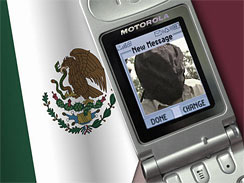
|  |  |  Editorials | Issues Editorials | Issues  
Wary Mexicans Shun Cellphone Database Meant to Bolster Security
 William Booth - Washington Post William Booth - Washington Post
go to original
May 16, 2010


| | Critics say mandatory cell phone database to thwart extortionists will backfire. |  |
See related article: Personal Cellphone Data End Up For Sale at Mexico Flea Market

It sounded like a good call. To combat organized crime, especially the phenomenon known as "virtual kidnapping," the Mexican government ordered the owners of every cellphone in the country to register their names, numbers and addresses.

But in a remarkable mass protest, even under threat of service interruption, millions of Mexicans are refusing to submit their personal data, for a very Mexican reason: They don't trust the government.

The burgeoning Mexican cellular class - which now includes city swells with thrumming BlackBerrys and peasants with cheapo Nokias out in the fields - assumes that any personal information they give the state would inexorably flow into the hands of the very criminals the new law seeks to foil, creating a kind of White Pages for crooks and kidnappers.

"And these fears are not unfounded," said José Adán Ignacio Rubí Salazar, a federal legislator and head of the communications commission in the Chamber of Deputies.

According to the Federal Telecommunications Commission, a separate entity, 68 million cellphones have been registered but 17 million remain unlisted.

Because so many Mexicans declined to give their personal information, and because the data they did submit could not be authenticated, Rubí said, "the mobile-phone registry is, from a security standpoint, completely useless."

The National Mobile-Phone User Registry has been declared a fiasco. Its future remains unknown.

The goals were noble. With the end of cellular anonymity, authorities promised to combat the growing scourge of virtual kidnapping, or phoning victims to claim - falsely - that a spouse or child has just been kidnapped. The extortionists demand instant payment, by wire transfer or access to a bank account.

These fake kidnapping calls are often accompanied by the muffled sound of someone whimpering in fear or pleading for help. Mexican prisons frequently serve as the de facto call centers for these extortion rings, which operate in complicity with guards who provide phones and reportedly take a commission. Last week, in raid on a state prison in Jalisco, authorities seized assault rifles, handguns and 70 cellphones from inmates.

"It can be terrifying," said Lorenzo Meyer, a historian at the College of Mexico and one of the country's most prominent political and social analysts. "They are terrifying because we live in this atmosphere of violence. Where are our sons? We need to contact them every day, just for a minute."

Meyer says the phone fiasco is born of corruption: Mexico has the ideas and capacity to fight crime but, because of systemic graft, the public fears working with authorities.

Based on complaints to a hotline, criminals carried out more than 120,000 attempted extortions by phone last year, according to the advocacy group Citizens Council for Public Security. The average demand is for $250.

Fernando Ruíz Canales of the Council for Law and Human Rights, an independent group that tracks corruption and crime, reports even higher numbers - more than 6,000 daily calls. The council says most of the criminal cellphones are Mexico City numbers.

Ruíz estimates that more than 1 million names in the phone registry are fake. "This is a country where it is very easy to prove you are Juan Pérez when you are not really Juan Pérez," he said. There are mountains of fake diplomas, birth certificates, driver's licenses and the like in circulation. Ruíz said the registry was a good idea, but poorly managed.

As acts of protest, thousands mocked the government, registering their mobile phones under the names of celebrities, prominent politicians and law enforcement officials. In April, there were 5,200 mobile phones registered to President Felipe Calderón.

Nora Ruvalcaba Gámez, a congresswoman from the state of Aguascalientes, boasted that she registered a dozen cellphones under false names, including those of infamous narcotics traffickers and the attorney general. Ruvalcaba called Mexico "a paradise" for identity thieves, who are rarely prosecuted but instead pursue cybercrimes abetted by personal information that pours out of corrupted Mexican institutions.

As the government pushed citizens to register their phones, the newspaper El Universal sent a reporter out to the notorious black market bazaar in Mexico City known as Tepito and found that for $12,000 a person could buy the complete data set for every registered voter in Mexico - their names, addresses, dates of birth, driver's license and social security numbers. The vendors said their best customers included organized crime and police agents. |

 |
|  |



